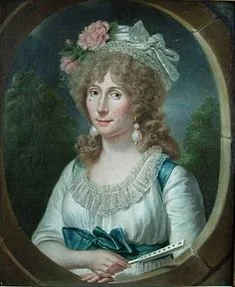“ When you can devote yourself to studying something you love, it is an intense pleasure: but if you have chosen a vocation for which every possible obstacle stands in your way, the simple desire to work becomes a tormenting passion, a torture of eery moment, an unbearable constraint.”
BIOGRAPHY MUSIC SOURCES
Amélie-Julie Candeille had a diverse artistic career as a singer, pianist, harpist, composer, librettist, novelist, comedian, and teacher of voice and keyboard. Her father, composer and singer, Pierre Candeille, began teaching his daughter music when she was 6-years-old and believed in educating her in a broad array of topics. With his guidance, Candeille made her inaugural appearance on the opera stage singing Diane in L’amour enchainé par Diane by Lenoir-Duplessis and performed in Gluck’s Iphigénie en Aulide at the age of 15. She sang both tragic and comedic roles while also highlighting her accomplishments as a keyboardist by performing concerti.
The French Revolution, Napoleonic Empire, and the Revolution of 1830 all occurred during Candeille’s lifetime which added complications to forging a career. Due to her father’s steady influence in opera and composition, she was afforded connections and protections amidst the many obstacles placed before her in the world of the theater. Candeille’s father encouraged her at one point to join a Masonic lodge so she could find aristocratic patrons. Candeille spent five years as an actor at the Comedie Francaise where she debuted her first 3-act comedy, Catherine, ou la belle fermière, for which she wrote the words and music and simultaneously sang the lead role while accompanying herself on the harp. Au tems orageux des folies from Catherine, in particular, was written for voice and harp as a simple romance and was published successfully in a few keys. As a result of Candeille’s hard work, the opera ran successfully for 154 performances. She wrote another seven theater pieces but none was as popular or successful as Catherine.
After her brief year-long marriage to Louis-Nicolas Delaroche, a medical practitioner, Candeille suffered a number of failed stage works. She took up writing novels and poetry and later married Belgian coach builder, Jean Simons, living in luxury in Paris and Brussels until his business went bankrupt. As a result of their financial circumstances, Candeille, who was now supporting her ailing father, was compelled to work out of financial necessity. Candeille’s contemporary, Sophie Bawr, also had a similar experience.
Candeille’s financial situation was partially restored due to the generosity of Louis XVIII, who reinstated Candeille and her father’s pensions before and after the return of Napoleon. In the interim period, Candeille fled to London and gave concerts. When she returned to Paris she resumed teaching in her home and wrote books to support her family. Her third marriage to Hilaire-Henri Périé was also a complicated challenge due to financial concerns and gossip over Candeille’s pension.
Candeille died from health issues at the age of 66. At the time of her death, she lived quite modestly even though her music and writing were highly regarded during her lifetime.

